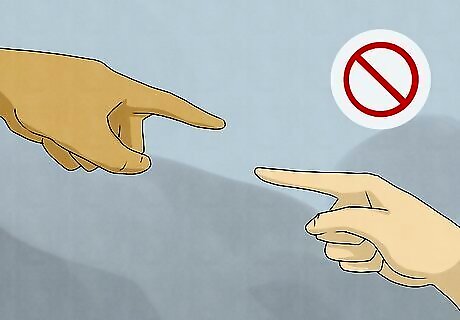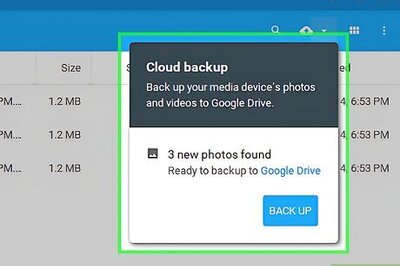
views
Expressing Yourself

Tell your partner clearly and openly how you’re feeling. Try to talk with them as soon when issues arise instead of bottling up your feelings inside. This way, you and your partner can stay on the same page. As you open up, try to keep emotion out of the conversation; instead stay grounded on the topic at hand. You might say, “Lately, I feel like our relationship isn’t a priority for you. I’m not trying to point any fingers, but I just want to be honest with you.” Good communication isn’t always about being “right.” Be prepared to compromise as you talk things out with your partner. Reader Poll: We asked 419 wikiHow readers who've struggled to find independence in their relationship, and 62% of them agreed the biggest hurdle was meeting their own emotional needs. [Take Poll]
Listening to Your Partner

Listen closely as your partner airs out any issues they have. Communication is a two-way street, and listening is an essential part of a healthy relationship. If your partner is going through a tough time, invite them to share what’s on their mind. Try to stay engaged throughout the conversation, and let them know that their thoughts and feelings are important. Restating, reflecting, and summarizing are great ways to be an active listener. You might say something like, “Let me make sure I’m on the same page…” “It sounds like…” or “I can tell that you’ve been thinking about this a lot.”
Household Responsibilities

Try to view a situation from your partner’s perspective. If you and your partner run into issues about who should be doing what around the home, it’s perfectly natural to feel defensive. Instead, try to push past these feelings and view the conversation through your partner’s eyes. Your discussion might be more productive and understanding if you look at the issue from their point of view. Instead of saying “I don’t get why you’re so upset about this,” you might say, “I’m sorry you’ve felt this way. I didn’t mean to leave all the trash and recycling to you last night.”
Intimacy Issues

Identify you and your partner’s attachment styles. People with different attachment styles tend to act differently. Attachment styles, or the way you connect and relate to other people, play a role in your relationship. Compare your attachment style with your partner’s in a friendly, open conversation. Once you know your attachment style, you’ll have an easier time addressing your intimacy issues. If you have an anxious or avoidant attachment style, focus on building your self-esteem and putting yourself out there with your partner.
Bad Habits

You might be repeating a past habit without realizing it. Think about your family life and past relationships. Are your past habits and relationships leaking into your current one? Pinpointing these bad habits can help you separate your past from your present, and lead to healthier conversations with your partner. For example, if you tended to pick fights with your parents as a child, you might pick fights with your partner without realizing it.
Arguments

Don’t play the blame game with your partner. Instead, think about the kinds of conflicts and arguments you and your partner usually have, and why they happen. Once you recognize and identify these patterns, make an effort to change and mold them into something healthier. For instance, if your partner tends to leave their dirty laundry on the floor, say something like, “I don’t want to start a fight, but I’ve noticed that you don’t seem to listen or care when I remind you to put your laundry away. Is there a way we could compromise on this?”
Daily Conflicts

Every relationship “problem” is just an incorrect answer to a bigger issue. Instead of focusing on individual issues, try to look at the bigger scheme of things. The next time you run into a problem with your partner, focus on the cause instead of the effect. For instance, if your partner forgets to do the dishes, suggest making a chore chart instead of criticizing them for forgetting. If your partner is in a bad mood, ask “What’s on your mind?” instead of saying “What are you pissed about?”
Emotional Connection

Rewind back to the very beginning of your relationship. After spending weeks, months, and years with the same person, it’s completely valid to lose a bit of perspective along the way. Instead, think about what attracted you to your partner in the first place. Spend some time reconnecting and chatting—this may help you find your roots, and relight that spark between the both of you. You might ask a simple, open-ended question, like “If a crystal ball could tell you an absolute truth about your past, present, or future, what would you ask?” EXPERT TIP Chloe Carmichael, PhD Chloe Carmichael, PhD Licensed Clinical Psychologist Chloe Carmichael, PhD is a Licensed Clinical Psychologist who runs a private practice in New York City. With over a decade of psychological consulting experience, Dr. Chloe specializes in relationship issues, stress management, self esteem, and career coaching. She has also instructed undergraduate courses at Long Island University and has served as adjunct faculty at the City University of New York. Dr. Chloe completed her PhD in Clinical Psychology at Long Island University in Brooklyn, New York and her clinical training at Lenox Hill Hospital and Kings County Hospital. She is accredited by the American Psychological Association and is the author of “Nervous Energy: Harness the Power of Your Anxiety” and “Dr. Chloe's 10 Commandments of Dating.” Chloe Carmichael, PhD Chloe Carmichael, PhD Licensed Clinical Psychologist Noticing romantic neglect can be the first step to improve a relationship. Noticing when the romance in your relationshiop is feeling depleted is a wake-up call not to be dismissed. Rather than ignoring it, use that awareness as a catalyst to proactively revive the connection. Share your observations gently and ask what's missing and how to fill the gaps. Keep it real.
Time Spent Together

Variety is essential to a healthy relationship. After spending a lot of time with your partner, you might develop a “fantasy bond.” This is a fancy term for merging your identity with your partner’s, instead of viewing each other as separate people. To break this bond, try changing your usual routine by spending some more quality time with your friends and trying new things. For instance, you might go to the movies one weekend if you usually spend the night in. You might try out a new restaurant instead of eating dinner at home.
Busy Schedules

Schedule outings or activities to do together. During the hustle and bustle of your daily routine, you might lose that “magic” you had when the relationship first started. Instead, try setting aside time each day to do something really fun or engaging together. Some quality time together might help you rekindle and reconnect in your relationship. For instance, you might sign up for a cooking or dance class together, or take a daily walk around the neighborhood. You could have a heartfelt conversation each morning over a cup of coffee.
Lack of Affection

Try touching each other more. Believe it or not, simple, affectionate touch can go a long way in a relationship. Touching your partner is a simple but effective way to show that you’re thinking about them and that you care. Even something like a simple touch on the forearm can really help rekindle a connection between you and your partner. You might pat your partner on the shoulder if they’ve had a rough day, or offer to give them a hug. If touch isn’t a big part of your relationship, talk to your partner about it! An open conversation might help you pinpoint some issues in the relationship.
Insecurity

Practicing gratitude helps you feel better about a relationship. Look for opportunities to tell your partner thanks, whether they did an extra chore, offered helpful advice, or something else unrelated. When you say thanks often, both you and your partner feel better and secure about the relationship overall. You might thank your partner for making the bed that morning, or for picking up some extra ingredients at the grocery store.
Money Issues

Tackle your household finances as a pair. In many relationships, budgets and finances are managed in an unbalanced way. To avoid this pitfall, assign each other “jobs” related to the household finances. You might keep these jobs permanently, or trade every month. Working in tandem is a great way to better manage your budget. For instance, you might be in charge of grocery shopping for one month, while your partner manages your savings. Then, you can switch roles the following month.
Infidelity

Visit a marriage or couple’s therapist. Infidelity can be a huge roadblock in a relationship, and talking it out may not feel like an option. That’s okay! Talk to your partner about meeting with a couple’s therapist, who can offer valuable insights and advice. If you don’t feel like seeing a therapist, reach out to another trustworthy third party, like a religious leader or close friend.




















Comments
0 comment